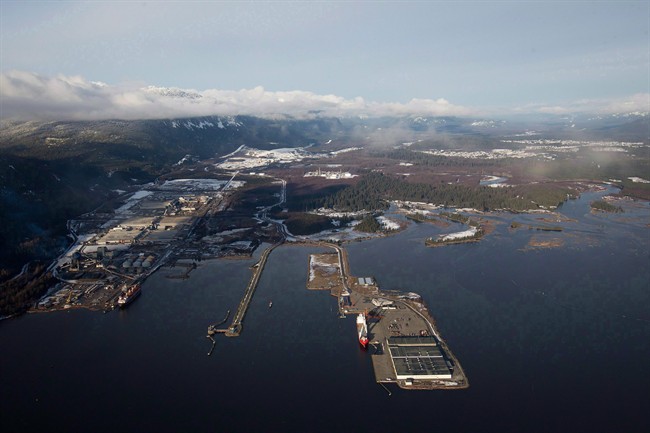VANCOUVER – The British Columbia government officially declared opposition to the Northern Gateway pipeline on Friday, telling a federal review panel that the multibillion-dollar project should not go ahead as proposed.

In a submission to the panel following more than a year of hearings, lawyers for the westernmost province said there remain too many unanswered questions.
“(Northern Gateway) has presented little evidence about how it will respond in the event of a spill,” the province said.
“Given the absence of a credible assurance in this regard, the province cannot support the approval of or a positive recommendation from the (panel) regarding this project as it was presented.”
The proponent, Calgary-based Enbridge (TSX:ENB), has promised more planning and study once approval is granted, the province pointed out.
“‘Trust me’ is not good enough in this case,” said the 99-page submission.
However, the province’s stance is not the assured death of the project. Despite the rejoicing from opponents, the Alberta government and Enbridge were quick to suggest work will continue toward assuaging B.C.’s concerns.
“What we’re saying is that everything we’ve seen to date simply doesn’t make the grade at this point in terms of assuring British Columbians that the environment would be well-protected,” said B.C. Environment Minister Terry Lake.
“These are questions that are left hanging and we feel those need to be answered before we would support a certificate being issued.”
Those questions include oil spill response and the behaviour in water of diluted bitumen, the molasses-like oilsands product that would be destined for tankers off the B.C. coast.
The federal panel has already issued a list of 199 conditions that would be put in place should panel members decide to approve the project, but Lake said those are not sufficient.
Federal Natural Resources Minister Joe Oliver said his government is moving ahead with plans to enhance marine and pipeline safety, and to engage with First Nations on the issue of West Coast energy infrastructure.
“We have been clear: resource development will not proceed unless it is safe for Canadians and safe for the environment,” Oliver said in a statement.
He said Ottawa will continue to engage all provinces on diversifying oil and gas markets. That diversification “remains a critical priority,” Oliver said.
Opponents of the project were quick to congratulate the province.
“Enbridge would like to move forward on a promise, and the B.C. government is absolutely right in saying that we can’t trust them to do that,” said Art Sterritt, executive director of the Coastal First Nations.
John Bennett, executive director of the Sierra Club Canada, called it an “historic” decision.
“Days like this give meaning to 50 years of environmental activism,” Bennett said in a statement.
Groups including the Dogwood Initiative, the World Wildlife Federation and the National Wildlife Federation echoed those sentiments, and a Calgary-based clean-energy think tank called it a cautionary tale for Ottawa, Alberta and the oilsands industry.
“If they want to see additional pipelines, they will need to accelerate improvements toward regulating upstream impacts of oilsands development and minimizing the risk of oil spills,” said Nathan Lemphers of the Pembina Institute.
The Gitga’at First Nation applauded the province for its leadership.
But B.C. left the door open to changing its mind before the panel issues its report at the end of the year, and included recommendations for strict conditions the government believes should be put in place should the panel decide to issue a certificate.
The 1,600-kilometre twin pipelines would transport oil from just outside Edmonton to a tanker port in Kitimat, on the northern B.C. coast. There, oil would be loaded onto hundreds of tankers a year for transport to Asian markets.
The project would free land-locked Alberta to expand its customer base beyond the United States — a development worth billions of dollars in additional revenues.
Diana McQueen, Alberta’s minister of environment and sustainable resource development, was not available to comment, but she issued a statement saying the two provinces have a shared commitment to both protecting the environment and economic growth.
She acknowledged the B.C. government has concerns that need to be addressed.
“I understand from B.C.’s announcement today that the government is not comfortable supporting the project as proposed without more assurance that environmental protection and public safety are adequately addressed,” McQueen said. “B.C., like Alberta, wants to ensure that our energy development is responsible and safe.”
Janet Holder, executive vice-president Western access for Enbridge, suggested B.C. simply affirmed its commitment to five conditions for approval that B.C. announced last year.
Those conditions can’t be fully met until the panel process is complete at the end of this year, she said. In the interim, Northern Gateway will be working with the province.
“We are working hard to meet the conditions and earn the confidence of the government and the people of B.C.,” Holder said in a statement.
The review panel will hear final arguments at hearings starting next month in Terrace, B.C., and a final report is due to the federal government by the end of the year.
Adrian Dix, the leader of the B.C. New Democrats, said the Liberal government’s formal rejection of the project is “too little, too late.”
The province signed an agreement with Ottawa in 2010 giving the federal government ultimate authority to approve the project.
“Even with this submission, the final say rests with Stephen Harper,” Dix said.
Nikki Skuce of Forest Ethics said Ottawa does have the final say, but she said it seems less and less likely the pipeline will win approval.
“I think it will be really difficult for the federal government to push a project through a province that didn’t want it, that has rejected it,” she said.



Comments